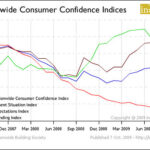The European stock markets ended a volatile week on Friday with modest losses, as tensions over tariffs between China and the United States continued to shake investor confidence.
The Stoxx 600 pan-European index fell 0.1% on Friday, after Thursday’s strongest session since 2022.
The UK FTSE 100 rose 0.64% following better than expected GDP figures for February. Meanwhile, the FTSE 250 midcap index was unchanged.
The DAX in Germany fell 0.9%, while the CAC 40 in France dropped 0.3%.
On the strength of the Euro, it gained 1.3% against US Dollars to $1.134. This is its highest value since February 2022. The optimism about the resilience of the economy in the eurozone has led to this increase.
Risk-off sentiment was evident in all sectors. The industrial, energy, and technology stocks were under pressure while the defensive sectors like utilities and consumer durables attracted investors.
Trump Tariff tensions dominate the market narrative
This session concluded a week of extreme volatility, fuelled by the policy uncertainties surrounding US President Donald Trump’s new tariff regime.
Midweek, the White House backed off its initial decision to apply steep “reciprocal duties” to nearly 90 countries. Instead, it imposed a blanket 10% levy on all imports for a period of 90 days, to give time for negotiation. China was excluded, as she faces a 145% penalty.
Beijing responded by increasing its tariffs against US goods from 84% to 125%. This heightened fears about a long-term disruption of global trade.
The European equity markets have been more resilient than those in the US, despite these recent developments.
The Stoxx 600 has only dropped 4.4% compared to the S&P 500’s nearly 11 percent year-to date.
The CAC 40 in France has fallen 4%. The FTSE 100 has dropped by about 3%. And the FTSE MIB of Italy has only declined 0.9%.
The DAX in Germany remains an anomaly, with a 2.4% increase so far this year.
This relative performance is attributed by analysts to the expectation that economic impact from US-led Trade Conflict will be lower in Europe.
Wall Street banks noted that Europe’s diverse export base, its stronger links to Asia, outside China, as well as more conservative responses in monetary policy, may help cushion the effect.
US Stocks on Friday
US stocks rose Friday after starting off the day with a red tint. Investors were trying to find their footing in a week that was dominated by headlines about tariffs and poor economic news.
The Dow Jones Industrial Average rose 140 points or 0.4% and the Nasdaq Composite gained 0.7%.
This move was made despite the fact that consumer sentiment had dipped, which briefly impacted equities.
Consumer sentiment at the University of Michigan for April was lower than anticipated, signifying a growing unease in households.
In the latest University of Michigan consumer survey, confidence dropped sharply from 57 to 50.8, down from 57.8 in March.
The reading is one of the lowest since the Pandemic-era’s lows, and it reflects the growing anxiety that consumers are experiencing amid rising inflation and trade tensions.
Consumers’ expectations for inflation in the year ahead have risen to their highest levels since 1981. This has fueled concerns about price pressures persisting even though broader indicators of inflation are showing signs of cooling.
The post European Stocks Wrap Volatile Week Mixed: FTSE100 inches higher, DAX Dips may be updated as new information unfolds.
This site is for entertainment only. Click here to read more






